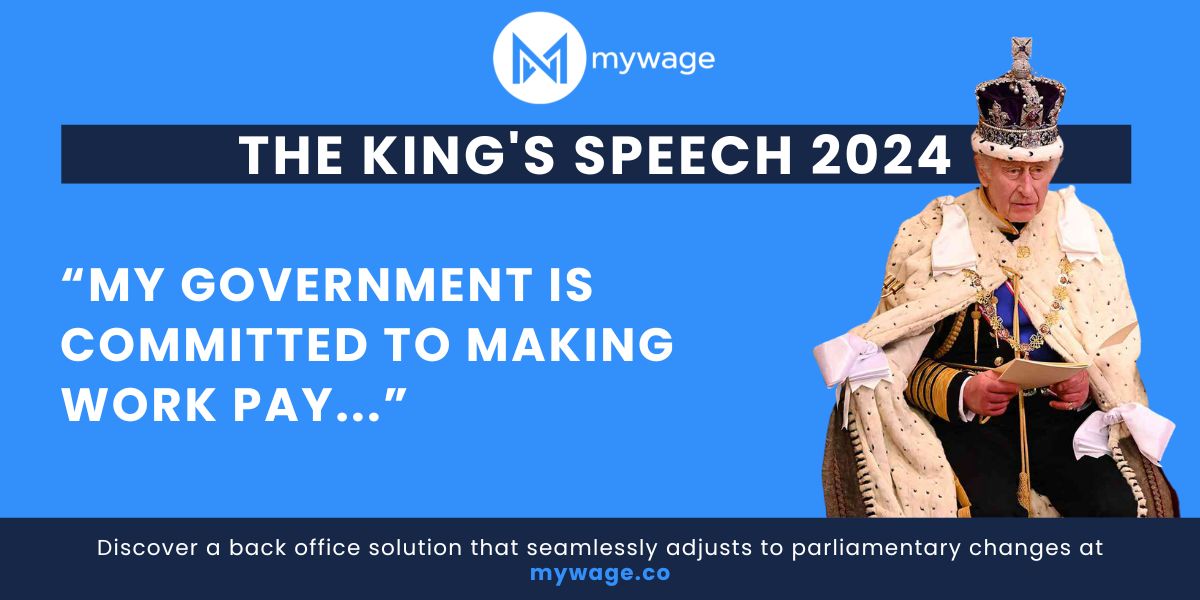The Employment Rights Bill, as presented in “The King’s Speech,” aims to significantly enhance the rights and protections for workers. This legislation is a crucial step towards improving the working conditions and security of employees across various sectors.

Below are some additional thoughts and implications from mywage on what this bill does and how it impacts workers and employers:
Ban on Zero-Hours Contracts
- Job Security: By banning zero-hours contracts, the bill ensures that employees have guaranteed working hours, providing them with more job security and financial stability. This change is especially important for those who previously had to deal with unpredictable schedules and income.
- Employer Adjustments: Employers will need to adjust their staffing strategies and may have to offer more part-time or full-time positions to comply with the new regulations.
Ban on Fire and Rehire Practices
- Protection from Exploitation: Banning fire and rehire practices protects workers from being unfairly dismissed and then rehired on less favorable terms. This practice has been criticized for undermining workers’ rights and leveraging their desperation for employment.
- Corporate Responsibility: Employers will need to adopt fairer negotiation practices and ensure any restructuring is done with genuine consultation and fairness.
Enhanced Rights to Flexible Working
- Work-Life Balance: Providing the right to request flexible working arrangements helps employees balance their work and personal life, leading to increased job satisfaction and productivity.
- Adaptability: Employers will need to be more adaptable and considerate in handling requests for flexible working, which could lead to more innovative and efficient workplace practices.
Parental Leave
- Support for Families: Enhancing parental leave rights supports new parents in balancing their career and family responsibilities, promoting gender equality in the workplace.
- Retention of Talent: Companies that support parental leave are more likely to retain talent, as employees feel valued and supported during critical life stages.
Sick Pay
- Health and Well-being: Ensuring adequate sick pay encourages employees to take the necessary time off to recover from illness without financial worry, reducing the spread of illness in the workplace.
- Corporate Responsibility: Employers need to factor in the costs and logistics of providing fair sick pay, fostering a healthier and more supportive work environment.
Immediate Protection from Unfair Dismissal
- Job Security from Day One: Granting immediate protection from unfair dismissal ensures that employees are safeguarded against wrongful termination from their first day on the job, promoting a fairer and more just work environment.
- Employer Due Diligence: Employers must exercise greater diligence in their hiring and firing practices, ensuring that dismissals are fair, justified, and well-documented.
Implications for the Workforce and Economy
Increased Worker Morale and Productivity:
- By securing more rights and protections, employees are likely to experience increased job satisfaction, which can lead to higher morale and productivity. A workforce that feels valued and secure is generally more motivated and loyal to their employer.
Economic Stability for Workers
- With guaranteed hours, fair treatment, and financial protections in place, workers will have greater economic stability, which can contribute to a healthier overall economy. More disposable income can lead to increased consumer spending, benefiting businesses and economic growth.
Challenges for Small Businesses
- While large corporations may find it easier to adapt to these new regulations, small businesses might face challenges in implementing these changes. They may need support and guidance to ensure they can comply without compromising their financial viability.
Promotion of Fair Employment Practices
- The bill sets a precedent for fair employment practices, encouraging a culture of respect and fairness in the workplace. This can enhance the reputation of businesses and the country as a whole as a fair and attractive place to work.
Conclusion
The Employment Rights Bill, as outlined in “The King’s Speech,” represents a significant step forward in enhancing the rights and protections for workers. By addressing exploitative practices and providing essential rights, the bill aims to create a fairer, more secure, and supportive working environment for all employees. The successful implementation of these changes will require cooperation and adaptation from both employers and employees, ultimately leading to a more equitable and productive workforce.
We’re seeing the flexible workforce economy grow by the day, and Labour’s legislation is only going to speed that process up. By prioritising strong onboarding and HR processes, optimising payroll and compliance, and implementing effective communication channels for your flexible workers, you’re on the road to a more productive flexible workforce for the future.
Prepare your business for the future of flexible working at mywage.co





